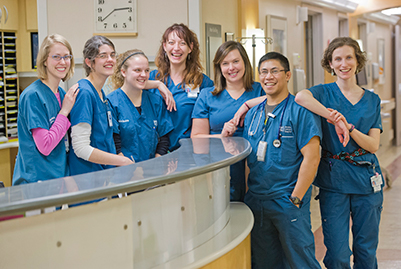Brian Makes Full Recovery Following
Back-to-Back Heart Attack and Stroke

It takes more than clinical excellence for medical professionals to motivate a patient facing the physical and emotional effects of a sudden, significant injury. For Brian, a Chicago north side resident and patient of Swedish Hospital’s inpatient rehabilitation unit, it was the compassion of the staff that made all the difference.
After receiving treatment at a local hospital for an unexpected heart attack, Brian woke one morning to find that a stroke had paralyzed his left leg, arm and hand. Once his condition was stabilized, he was transferred to Swedish Hospital for
inpatient rehabilitation.
Upon arrival, Brian was evaluated by a team of rehabilitation specialists. Based on this assessment, they worked together to create a personalized, comprehensive care plan. “The therapy was geared specifically to get me back to where I used to be,” Brian said. “They focused on practical movement—things I could have normally done. To return to my job, the therapists had to get me to use my fingers and get my mental processing back.”
During the arduous process of regaining his faculties, Brian reached a number of notable milestones, marking his journey in measurable progress. The first came by regaining his ability to walk. With the help of an overhead harness support system, a tool used in gait training to provide stability for the patient while supporting some of their weight, Brian’s physical therapist assisted him to take his first steps since the stroke.
Soon after, Brian’s occupational therapist helped Brian in taking a shower with minimal assistance and the aid of adaptive equipment. “I was able to clean myself for the first time in months,” he said. “It was an amazing feeling.” For a patient suffering from significant physical deficits, regaining the ability to complete basic hygienic tasks can seem the most daunting. Once Brian mastered this task, he began to realize how significant his recovery was.
But inspired care is more than effective clinical treatment; it’s the staff’s drive to provide care that goes the extra mile, treating a patient both inside and out. The compassion and dedication the staff showed Brian was crucial on days when he didn’t feel his best.
Another key component to Brian’s recovery was his family; the support and encouragement they provided improved his mood and motivated him by reminding him what he was fighting to return to. Knowing the significance of a family support system, the staff often collaborated to better serve Brian. On one day in particular, collaboration meant the celebration of a very special event.
Brian was a patient of Swedish Hospital during winter, which encompassed a number of major holidays, including his birthday. Though Brian’s stay was positive, the weight of injury has the potential to dampen a patient’s mood when spending special occasions in a clinical setting. In order to remedy this, the staff worked with his wife to throw him a surprise birthday party. “It really uplifted my spirit,” Brian said. “It meant a lot to me that they would do that.”
Flu season prevented Brian’s five grandchildren from visiting him on the unit, so the staff arranged for Brian to receive them on the first floor of the building. But the intimacy of the family’s visitations was affected by another of the stroke’s effects. Brian suffered from a communication deficit that kept him from making eye contact with the person he was speaking to. Knowing the importance of the relationship between Brian and his family, his speech therapist made it a priority to return him to his prior communicative ability. “The speech therapist would talk with me, just me and her, and made me keep eye contact the whole time,” he said. This personal care aided Brian’s emotional recovery, allowing him to cherish the time spent with family all the more.
When his family was not visiting, Brian was able to use his recovered communicative faculties to foster new relationships with the other patients. “They encouraged us to communicate with each other,” Brian said. “There were several other patients on the floor that were older than me and going through the same thing. Seeing their progress was very uplifting.”
At the time of his discharge, Brian was able to communicate effectively, perform cognitive tasks and walk. To build upon the progress he had made, one of Swedish Hospital’s social workers helped him find a home therapist who could continue the therapy.
“Now my arm and hand are about 80-90% back to normal,” Brian said. “Before, I couldn’t even lift my granddaughter—who is 25 pounds—and I wouldn’t feel safe trying.” As a result of the care he received at Swedish Hospital, as well as Brian’s own effort, he is once again able to carry his granddaughter around all that he likes, and has the strength to do much more than that.
To learn more about rehabilitation services at Swedish Hospital, please call
773-878-6888.
By David Modica | Published December 8, 2015

